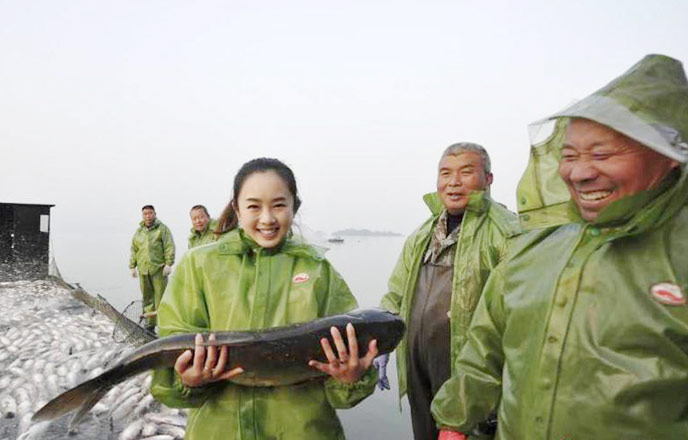New CPC leadership marks 100 days in power
BEIJING - Chinese people are used to celebrating a newborn's 100th day, thinking it an important mark for a baby's growth. Sometimes, the custom can also apply to a ruling Party's new leadership.
One hundred days since the new leaders of China's ruling Communist Party of China (CPC) took the helm, their "new deals" continue to inspire the Chinese people. Changes have been seen, though there are still tests and expectations ahead.
On Nov 15, 2012, the leadership was elected one day after the 18th CPC National Congress concluded, and they made their first public debut the same day.
The whole world was speculating in what direction they would lead the world's largest political party and the world's most populous country.
The "inaugural speech" by Xi Jinping, the new general secretary of the CPC Central Committee, when he met with several hundred journalists on Nov 15, is still frequently talked of by ordinary Chinese people.
In it, he mentioned the word "people" nearly 20 times and "responsibility" more than 10 times.
Xi stressed, "We must first of all conduct ourselves honorably" and vowed to rally and lead the Party and all Chinese people in carrying "the relay baton" passed on to the new leadership by history, and in continuing efforts to achieve the great renewal of the Chinese nation.
The 100th day of the leadership's reign, which falls on Feb 22, is a good time for retrospection and for looking forward as well.
NEW DEAL
Xi and the other six newly elected members of the Standing Committee of the CPC Central Committee Political Bureau have followed a very tight timetable in their first 100 days of rule.
They made many inspection tours of poverty-hit rural areas, sitting on brick beds, chatting with farmers and learning the real situation.
They convened many efficient, down-to-earth but frugal meetings, and promulgated a series of practical and to-the-point policies and measures.
Their jargon-free speeches have become popular soundbites.
The new CPC leaders also used their public appearances in various occasions -- inspection tours, meetings and speeches -- to deploy political, economic, diplomatic and national defense work, showcasing their ruling principle and concept.
These moves were hailed by media from home and abroad as the "new deal."
Xi has presided over four Political Bureau meetings of the CPC Central Committee in a little over three months, respectively on implementing the spirit of 18th CPC National Congress, on fighting bureaucracy and analyzing the economic work of 2013, on fighting corruption and on optimizing Party membership.
He delivered speeches at three study sessions of the Political Bureau of the CPC Central Committee, respectively on developing socialism with Chinese characteristics, on deepening reform with more political courage and wisdom and on sticking to the path of peaceful development.
On the 15th day after being sworn in, Xi, along with the other six members of the Political Bureau Standing Committee, visited "The Road Toward Renewal" exhibition in Beijing, and further explained the ambitious goal of realizing the nation's rejuvenation with a speech emphasizing the "Chinese dream."
Realizing the nation's great rejuvenation is "the greatest dream in the country's modern history," he said.
The general secretary pledged to promote the authority of the Constitution and the rule of law on Dec 4 at a congress marking the 30th anniversary of the implementation of China's 1982 Constitution.
He stressed "no organization or individual has the special right to overstep the Constitution and law, and any violation of the Constitution and the law must be investigated and dealt with."
The new CPC leadership also adopted an unusually tough tone when pinpointing the urgency to fight corruption.
Xi vowed to unswervingly battle against graft, saying "power should be restricted by the cage of regulations" at a CPC disciplinary watchdog meeting on Jan 22.
The Party should swat "tigers" and "flies" at the same time by dealing with officials' illegal activities on one hand and on the other tackling more trivial malpractice, which nevertheless closely impacts upon the people, he said.
Xi vowed a fight against privilege, and "no exceptions" when it comes to Party disciplines and law.
"We must not relax the use of penalties if we want to rule Party members strictly," he said.
Xi also urged the Party to be more tolerant of criticism and receptive to the views of non-communists on Feb. 6 at a gathering convened to extend Lunar New Year's greetings to people from non-communist parties, the All-China Federation of Industry and Commerce, and those without party affiliations.
"The CPC should be able to put up with sharp criticism, correct mistakes if it has committed them and avoid them if it has not," he said.
A two-day central economic work conference held at the end of 2012 offered a first glimpse into the economic policies of the new CPC leaders, who vowed to focus on quality and efficiency of economic growth in 2013.
The conference, which set the tone for economic policymaking this year, also made specific arrangements for realizing economic development goals.
The new CPC leadership have also set themselves as role models of enhancing flesh-blood bonds with the general public.
Xi chose South China's Guangdong province, which served as the testing ground for reform and opening up policies more than 30 years ago, as the destination of his first inspection tour outside of Beijing after he took office, vowing no stop in reform and opening up.
During his other two inspection tours outside of China's capital, Xi visited impoverished areas in North China's Hebei province and Northwestern Gansu province.
One of Xi's destinations in Hebei was Luotuowan, a village in Fuping County. Luotuowan, nestled deep in mountains, is classed as "especially impoverished" by the country's standard, with local people's per capita income under 1,000 yuan ($160 dollars) a year.
According to Luotuowan's Party branch secretary, Gu Runjin, Xi "randomly" walked into households in the village during his trip on Dec 30.
"He's very concerned about people's livelihood," Gu said, recalling Xi's questions to villagers.
During his trip, Xi said that a moderately prosperous China won't come if people in rural areas, especially poverty-stricken regions, can't live a well-off life.
Analysts believe this is a declaration of the CPC leaders' adherence to the path of common prosperity.
From paying visits to AIDS patients, farmers, street cleaners and taxi drivers to soliciting views from non-communist parties, the new leaders' appreciation of first-hand materials and down-to-earth work styles have impressed the public.
"The general secretary reached out to me first to shake hands and asked me if the drugs I took have side effects. He also encouraged me to stick it out," said a person surnamed Yang who is living with HIV/AIDS.
- China to keep sound growth under new CPC leadership
- China's fast development is due to CPC leadership
- China under CPC leadership to enjoy more prestige
- China makes remarkable progress under CPC leadership
- Political reform must under CPC leadership
- Xi attributes Tibet's development to CPC leadership
- Panchen Lama calls for support for CPC leadership
- Wuhan pilots cardless ATMs with facial recognition technology
- 700m people lifted out of poverty in over 30 years: white paper
- China provides world with $58 billion in development aid in six decades: white paper
- White paper says China on forefront in int'l peacekeeping
- China establishes system to ensure people's right to development: white paper
























